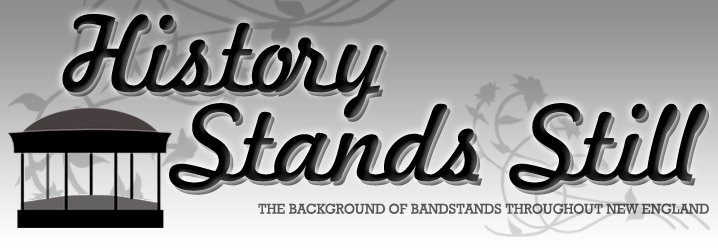BRISTOL VT
Roy J. Clark Memorial Bandstand
Bristol Village Park
Built - 1937

 Bristol was originally named Pocock, after Admiral Sir George Pocock - son of an English Vicar but changed to its present name in 1789, generally believed to be named after Bristol, Rhode Island. The town is considered to be the gateway to Vermont's famed Green Mountains lying at the foot of Deerleap and South Mountains. Its chief attraction is the Lord's Prayer Rock which had the prayer chiseled into it by a physician from Buffalo, New York who was originally from the town and still had a great fondness for it. The town also has a nearly solid rock area of land known as Hell's Half Acre which is the focal point of a century's old tale about an old Spaniard who claimed that as a young boy, his father and others had mined a vast amount of silver in the surrounding mountains and hid it in that area. Many people since have mined that region looking for the silver treasure and as a result, the area has many tunnels and pits.
Bristol was originally named Pocock, after Admiral Sir George Pocock - son of an English Vicar but changed to its present name in 1789, generally believed to be named after Bristol, Rhode Island. The town is considered to be the gateway to Vermont's famed Green Mountains lying at the foot of Deerleap and South Mountains. Its chief attraction is the Lord's Prayer Rock which had the prayer chiseled into it by a physician from Buffalo, New York who was originally from the town and still had a great fondness for it. The town also has a nearly solid rock area of land known as Hell's Half Acre which is the focal point of a century's old tale about an old Spaniard who claimed that as a young boy, his father and others had mined a vast amount of silver in the surrounding mountains and hid it in that area. Many people since have mined that region looking for the silver treasure and as a result, the area has many tunnels and pits.Bristol also has continuously held a 4th of July celebration for over 225 years now involving firework displays, parades and "Outhouse Races," concerts, silent auctions, and many floats and is the longest running parade in the state of Vermont.
The town's first bandstand, in the town park, was built in 1913 which was just a floor with surrounding railings and was later replaced by the current bandstand in 1937 which today is in fine shape and has had little changes made to it other than a newly refurbished floor completed in 1998. The bandstand is named after a prominent citizen of the town, Roy J. Clark, and is home for the Bristol Band which has been in existence since the 1870s and is the oldest in the state of Vermont. The bandstand plays host to many other bands during the warmer summer months, normally on Wednesday evenings. The structure has had visits by many VIPs including "Big Joe" Borrell and Tammy Fletcher.
INFORMATION SUPPLIED BY:
Shirley Emilo, Administrative Assistant

No comments:
Post a Comment